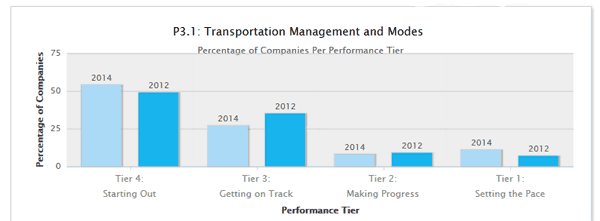An evaluation of 613 of the largest public companies in the US found a mixed bag in terms of the state of sustainability in corporate America, with progress being made by many companies but with a conclusion that overall "corporate actions and solutions are not keeping pace with the required level of change."
The massive report was produced by Ceres, a non-profit environmental advocacy group, in partnerhip with, Sustainalytics, an environmental research firm. Both are based in Boston. It follows a similar analysis last produced in 2012.
The report looks at corporate sustainability performance across the four high-level areas Ceres had previously defined as key to sustainability improvement: governance, stakeholder engagement, disclosure, and performance. The analysis was done by mining Sustainalytics' apparently large database that holds information about corporate actions and policies across dozens of individual sustainability attributes, such as, for example, whether a company has a published supplier code of conduct.
How that database was developed and maintained is not clear.
Below are some of the key findings from the new report:
Corporate boards of are not taking enough responsibility for overseeing sustainability efforts: 32% of the 613 companies' boards of directors formally oversee sustainability performance,
up from 28% in 2012.
A growing number of companies are incorporating sustainability performance into executive compensation packages: 24% link executive compensation to sustainability performance, up from 15% in 2012. However, only 3% link executive compensation to voluntary sustainability performance targets, such as greenhouse gas emissions reductions.
More companies are actively engaging employees on sustainability issues: 42% have some programs in place to engage employees on sustainability issues, an increase from 30% in 2012. The 6% that the report places in the top tier of sustainability performance go further by systematically embedding sustainability into company-wide employee engagement.
While many companies are taking action to reduce GHG emissions, few have set time-bound targets: More two-thirds of the companies evaluated are taking steps to reduce GHG emissions, but only 35% have established time-bound targets for such reductions. This is a small increase from 32% in 2012. 36% have targets but no timeframe, while 29% have no targets at all.
In terms of renewable energy, 37% of companies have implemented a program, compared to 35% in 2012. Yet only 6% have quantitative targets to increase renewable energy sourcing.
Companies are not doing enough to address water risks, especially in stressed regions: Of the 103 water-intensive companies evaluated, 50% assess water-related business risks, a slight decline from the 55% in 2012. Only 26% are prioritizing efforts in water stressed regions.
Additional innovation is needed to drive sustainable products and services: Of the 419 companies evaluated for this expectation, just 14% have formal programs to invest in and promote sustainability products.
More companies are setting clear sustainability standards for suppliers: 58% have supplier codes of conduct that address human rights in supply chains, compared to 43% in 2012.
Sustainability is increasingly a factor in supplier decisions: 47% of companies consider environmental and/or social criteria in procurement, just up from 46% in 2012. About one-third of companies engage suppliers on sustainability performance issues, up from 27% in 2012.
Transportation and logistics initiatives are behind: Less than half (46%) of companies in logistics intensive sectors have some activities to improve the environmental impacts of their owned or outsourced transportation operations, down from 51% in 2012. However the majority (54%) are in the bottom tier 4 in terms of performance, demonstrating no effort to address the environmental impacts of their transportation programs.
As can be seen in the chart below, the report's analysis shows just a small percent of companies are at the highest levels of performance in terms of sustainable transportation and logistics programs.
Half of Companies are Rates In the Botton Tier in Terms of Sustainable Transportation Practices

Source: Ceres and Sustainalytics
More than half of companies do not produce annual sustainability reports: 51% of companies studied did not produce sustainability reports. 32% produced such reports using the Global Reporting Initiative (GRI) guidelines, while 17% produced reports without using the GR structure.
As with the Carbon Disclosure Project, this report attempts to push companies in the direction of sustainability through pressure from investors and shareholders. It notes, for example, that over 1,200 investors have signed on to the Principles for Responsible Investment, and that 417 environmentally sustainable growth (ESG) shareholder resolutions have been recorded so far this year. It also makes notice of the Ceres Blueprint for Sustainable Investing.
Relatedly, the report warns of potential "carbon asset risks" for investors. It notes that despite the anti-carbon push, the world's largest 200 publicly traded fossil fuel companies spent $674 billion in 2012 to find and develop new reserves. That's more than double the $281 billion invested in clean energy globally the same year.
In a warning to investors, the report says that "Because the value of fossil fuel companies is closely tied
to their current and future reserves, they face carbon asset risk - the risk that a portion of their reserves could become stranded assets as the world transitions to a low-carbon future." The message: "sell Exxon."
The report also pushes pretty hard on the notion that statements and facts in sustainability reports should be validated by third-party audit firms.
"Just as shareholders and other stakeholders expect, and public companies are required, to have financial statements audited by independent third parties, subjecting sustainability statements to similarly rigorous scrutiny provides assurance that companies are walking the walk, not just talking the talk," the report says, noting just 9% of companies producing sustainability reports have those facts audited.
We've just scratched the surface here of what is in this report: to wade through the whole thing, go here: Gaining Ground: Corporate Progress on the Ceres Roadmap for Sustainability
Any reaction to this new Ceres report? Let us know your thoughts at the Feedback button below.

|